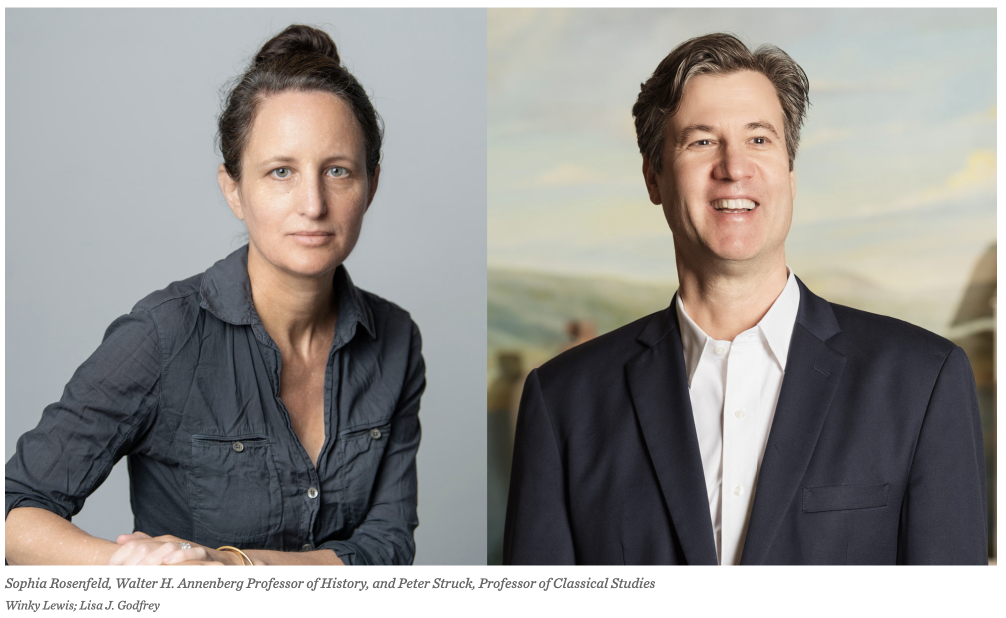How do you capture the nature of ideas over the course of 2,800 years? How do you adequately convey how each distinct time period and social, political, and cultural context shaped the development of those ideas?
These are the weighty questions that Sophia Rosenfeld and Peter Struck set out to answer as coeditors of a new series, A Cultural History of Ideas. The series features 62 expert contributors across six volumes covering Classical Antiquity, the Medieval Age, the Renaissance, the Age of Enlightenment, the Age of Empire, and the Modern Age. Each volume has identical chapter titles and themes that cohesively organize the series across volumes: Knowledge; the Human Self; Ethics and Social Relations; Politics and Economies; Nature; Religion and the Divine; Language, Poetry, and Rhetoric; the Arts; and History.
Here, we speak with Rosenfeld, Walter H. Annenberg Professor of History, and Struck, Professor of Classical Studies, about why they were eager to take on this massive undertaking, how people might approach the series in a variety of ways, and what they most hope readers will take way from the volumes.
How did you both become editors of this series?
Rosenfeld: The English publisher Bloomsbury has many series called A Cultural History of... So, our project is not the first such series, but I was approached by the publisher and asked, “Did I want to do a cultural history of ideas?” That’s a big idea in and of itself. My first thought was that I couldn’t possibly do this by myself. The only way I could possibly imagine doing this is if Peter Struck did it with me.
Struck: When Sophia came to me with the idea, I was delighted, but we both asked each other, “Is it crazy to think about doing almost 3,000 years of intellectual history in a coherent way—in a way that's going to contribute something new to our field?”
Rosenfeld: The scale of the project was enormous. We're talking six books, but within the six books, a whole series of sub-editors of different volumes, and then in every volume, multiple articles. None of us has the expertise to easily think about several thousand years of intellectual history and cultural history across a range of topics. But I knew that with Peter, who has a remarkable range over antiquity—Greek and Roman—and through the medieval and Renaissance period, I could dovetail my knowledge of the Renaissance onwards. Much to my luck, Peter agreed.
You knew this was going to be a herculean undertaking, yet you agreed to take it on. Why?
Rosenfeld: The first major challenge was coming up with categories that would make equal sense whether we were talking about Athens in the ancient period or Western Europe in the 1950s. Would concepts like nature, the divine, the arts, or even the self, make sense across those moments? Some of our most interesting conversations were trying to figure out categories that would be loose enough, but also meaningful enough, to work across this whole 2,800-year period. Another challenge was thinking about the right contributors. Who was doing interesting work that would allow us not to write a history of the famous thinkers lined up in a row, but rather to proceed much more in the vein of the cultural history of ideas, considering how ideas emerged, how they were put into practice, and how they were adopted and remade over time.
Struck: For me, the opportunity to contribute to a new perspective in the field was the most exciting piece. Part of what we're doing here is to claim that ideas don't just float around in space as prepackaged, little quanta of thinking that bounce around from place to place. They're produced in particular social contexts for particular reasons, and that means that there's a distinct way each age and each culture constructs knowledge for itself.

